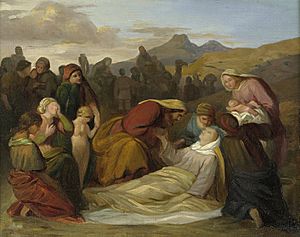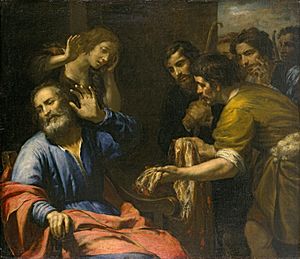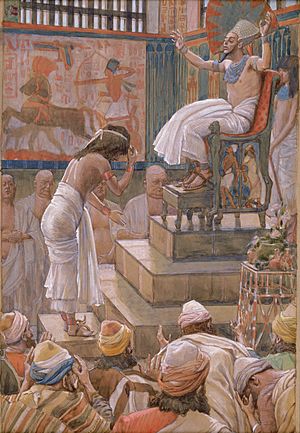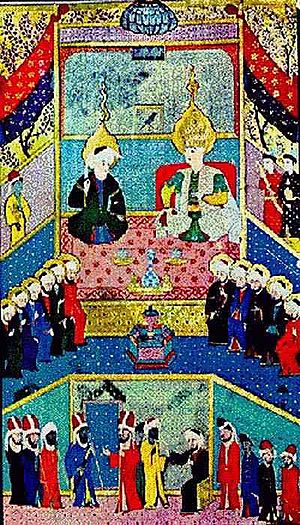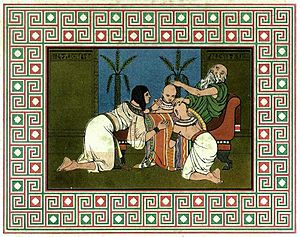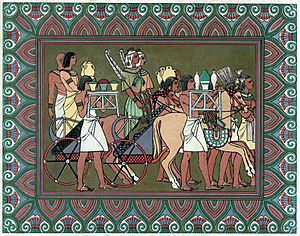Jacob facts for kids
Quick facts for kids
Jacob
|
|
|---|---|
| יַעֲקֹב | |
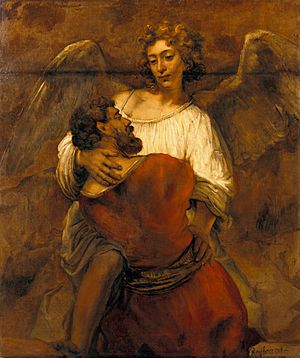
Jacob Wrestling with the Angel, by Rembrandt
|
|
| Resting place | Traditionally, the Cave of the Patriarchs, Hebron |
| Spouse(s) | |
| Children |
|
| Parents | |
| Relatives | |
Jacob (Hebrew: יַעֲקֹב, Modern: [undefined] Error: {{Transliteration}}: no text (help), Tiberian: Yaʿăqōḇ), later called Israel, is a very important person in the Bible. He is seen as a leader of the Israelites. Jacob is also a key figure in major religions like Judaism, Christianity, and Islam.
His story begins in the Book of Genesis. Jacob was the son of Isaac and Rebecca, and the grandson of Abraham. He was the younger twin brother of Esau. The Bible tells us that Jacob bought Esau's birthright. With his mother's help, he also received a special blessing meant for Esau.
Later, a big drought hit his home in Canaan. Jacob and his family moved to Egypt. This happened with the help of his son Joseph, who had become an important advisor to the pharaoh. Jacob lived to be 147 years old. He is believed to be buried in the Cave of Machpelah.
Jacob had twelve sons. These sons were born to his wives, Leah and Rachel, and their servants, Bilhah and Zilpah. His sons were Reuben, Simeon, Levi, Judah, Dan, Naphtali, Gad, Asher, Issachar, Zebulun, Joseph, and Benjamin. Each son became the head of a family group, which later formed the Twelve Tribes of Israel. Jacob also had a daughter named Dinah. The Bible says Jacob showed more love for Rachel and her sons, Joseph and Benjamin. This caused problems in the family. It even led to Joseph's older brothers selling him into slavery.

Understanding Jacob's Name
The name Jacob (Ya'aqov) comes from a Hebrew word meaning "heel." This is because Jacob was born holding onto his twin brother Esau's heel.
Later, Jacob was given a new name: Israel. This happened after he wrestled with a mysterious being. The name Israel means "one who struggles with God" or "a prince with God." This new name showed his strong connection with God.
Jacob's Story in Genesis
The main story of Jacob's life is found in the Book of Genesis, from chapters 25 to 50.
Jacob and Esau's Birth
Jacob and his twin brother, Esau, were born when their father Isaac was 60 years old. Their mother, Rebecca, had a difficult pregnancy. God told her that two nations were fighting inside her. He also said that the older son would serve the younger.
When they were born, Esau came out first. He was covered in red hair. Jacob came out right after, holding Esau's heel. Isaac and Rebecca named the first son Esau. The second son was named Jacob, meaning "heel-catcher."
As they grew up, the brothers were very different. Esau loved hunting and being outdoors. Jacob preferred staying in tents and living a quieter life. Their parents also had different favorites. Isaac loved Esau because he enjoyed his wild game. Rebecca, however, loved Jacob.
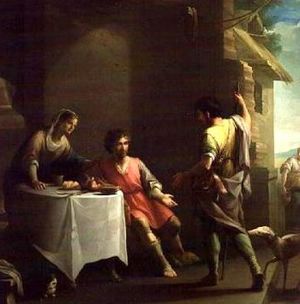
How Jacob Got the Birthright
One day, Esau came home very hungry from hunting. Jacob had just made some stew. Esau begged Jacob for some food. Jacob offered to give Esau the stew in exchange for his birthright. The birthright was a special privilege given to the firstborn son. Esau agreed, not thinking much of it at the time. This is how Jacob got Esau's birthright.
Isaac Blesses Jacob
As Isaac grew old and became blind, he wanted to give Esau his special blessing. He asked Esau to go hunt some venison and prepare a meal for him.
Rebecca, Jacob's mother, heard this. She remembered God's prophecy that the older son would serve the younger. She quickly told Jacob to bring her two young goats. She would make a tasty meal for Isaac, and Jacob would pretend to be Esau. Jacob worried that his father would feel his smooth skin and know it wasn't Esau, who was hairy. But Rebecca insisted, saying she would take any curse.
Jacob did as his mother said. Rebecca dressed him in Esau's clothes. She also put goatskins on his arms and neck to make them feel hairy.
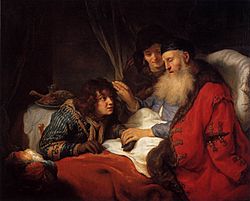
Jacob went to Isaac. Isaac was surprised Esau was back so fast. Jacob answered, "Because the LORD your God helped me." Isaac felt Jacob's hands, which felt hairy like Esau's. Confused, Isaac said, "The voice is Jacob's voice, but the hands are the hands of Esau!" He asked again, "Are you really my son Esau?" Jacob simply said, "I am." Isaac then ate the food and gave Jacob the blessing meant for Esau.
The blessing said: "May God give you dew from heaven and rich soil. May you have plenty of grain and new wine. May people serve you, and nations bow down to you. Be lord over your brothers, and may your mother's sons bow down to you. Cursed be everyone who curses you, and blessed be everyone who blesses you."
Soon after Jacob left, Esau returned. When Isaac realized he had been tricked, he was shocked. But he confirmed that Jacob would remain blessed. Esau was heartbroken and begged for his own blessing. Isaac could only promise that Esau would live by his sword and eventually break free from Jacob's rule.
Esau hated Jacob for taking his blessing. He planned to kill Jacob after Isaac died. Rebecca heard about this. She told Jacob to go to her brother Laban's house in Haran until Esau's anger cooled. She also convinced Isaac to send Jacob away by saying she didn't want him to marry a local girl from Canaan, as Esau had done.
Jacob's Dream of a Ladder
On his way to Haran, near a place called Luz, Jacob had a powerful dream. He saw a ladder reaching from Earth to heaven. Angels were going up and down it. God's voice spoke from the top of the ladder. God repeated many blessings to Jacob. He promised to be with him and to give his descendants the land.
In the morning, Jacob woke up. He named the place "Bethel", meaning "God's house." He then continued his journey.
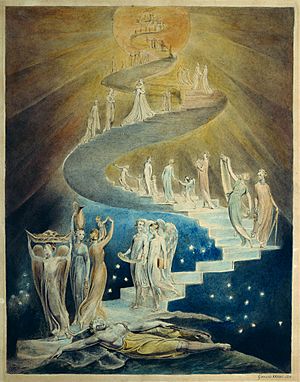
Jacob's Marriages and Family
When Jacob arrived in Haran, he met Laban's younger daughter, Rachel, who was a shepherdess. Jacob fell in love with Rachel right away. He agreed to work for Laban for seven years to marry her. These seven years felt like only a few days to Jacob because of his love for Rachel.
When the seven years were over, Jacob asked for Rachel. But Laban tricked him. He gave Jacob his older daughter, Leah, instead, veiled as the bride. In the morning, Jacob realized the trick. Laban explained that it was not their custom to marry off the younger daughter before the older. However, he agreed to give Rachel to Jacob as well, if Jacob worked another seven years. After a week of wedding celebrations with Leah, Jacob married Rachel. He then worked for Laban for another seven years.
Jacob loved Rachel more than Leah. God saw that Leah felt unloved, so He allowed her to have children. Leah gave birth to four sons quickly: Reuben, Simeon, Levi, and Judah. Rachel, however, could not have children. Following a custom of the time, Rachel gave her servant Bilhah to Jacob. Bilhah had two sons, Dan and Naphtali. Then Leah gave her servant Zilpah to Jacob. Zilpah had two sons, Gad and Asher. Later, Leah had more children: Issachar, Zebulun, and Dinah, Jacob's only daughter mentioned. Finally, God remembered Rachel, and she gave birth to Joseph and Benjamin.
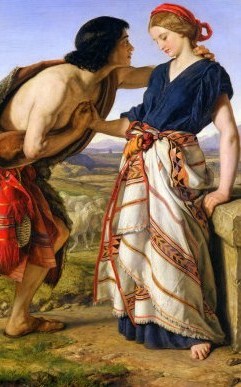
After Joseph was born, Jacob decided it was time to return home. Laban did not want him to leave because Jacob's presence had brought blessings to his flocks. Jacob suggested that he would take all the spotted, speckled, and brown goats and sheep as his payment. Jacob used a clever method involving peeled branches to increase his flocks. Over time, Laban's sons noticed Jacob's wealth growing. Laban's attitude towards Jacob changed.
In a dream, an angel of the Lord told Jacob to return to his homeland. So, Jacob, his wives, and children left without telling Laban. Before they left, Rachel secretly took some small household statues (called teraphim) from Laban's house.
Laban chased after them for seven days. God warned Laban in a dream not to harm Jacob. When they met, Laban asked why Jacob had left secretly and demanded his stolen household statues back. Jacob didn't know Rachel had taken them. He told Laban that whoever took them should die. Laban searched, but Rachel hid the statues by sitting on them. Jacob and Laban then made a peace agreement near Gilead. Laban returned home, and Jacob continued his journey.
Returning to Canaan
As Jacob got closer to Canaan, he sent messengers to his brother Esau. The messengers returned with news that Esau was coming to meet Jacob with 400 men. Jacob was very worried. He prayed to God for protection. He then sent many gifts of animals ahead to Esau.
That night, Jacob sent his family and flocks across the Jabbok river. He stayed behind alone. There, a mysterious being wrestled with him until morning. When the being saw he could not win, he touched Jacob's hip, causing him to limp. Jacob demanded a blessing. The being then told Jacob that his name would no longer be Jacob, but Israel, because he had struggled with God and with humans and had overcome.
Jacob asked the being's name, but he refused to say. Jacob then named the place Penuel, meaning "face of God," because he had seen God face to face and lived.
In the morning, Jacob arranged his family. He put his servants and their children first, then Leah and her children, and Rachel and Joseph last. This was likely to protect Rachel and Joseph more. Jacob himself went in front. Esau's anger seemed to have gone away because of Jacob's gifts. Their reunion was very emotional.
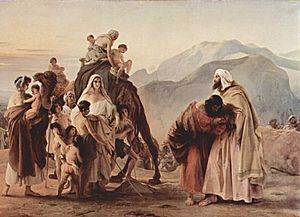
Esau offered to travel with them, but Jacob said his children and animals were too young to travel fast. Jacob suggested they would meet later at Mount Seir. Jacob actually went to Succoth. He and Esau did not meet again until they buried their father Isaac.
Jacob then arrived in Shechem. There, Jacob's daughter Dinah faced trouble. Her brothers, Simeon and Levi, reacted strongly to protect her. They caused a lot of conflict, which Jacob did not approve of. He later criticized his two sons for their anger.
Jacob returned to Bethel, where he had another vision of blessing. Rebecca's nurse, Deborah, died and was buried there. Jacob called the place "Oak of Weepings."
Jacob moved again while Rachel was pregnant. Near Bethlehem, Rachel gave birth to her second son, Benjamin (Jacob's twelfth son). She died during childbirth. Jacob buried her and built a monument over her grave. Rachel's Tomb is still a popular place for visits today. Jacob then settled in Migdal Eder. Finally, Jacob was reunited with his father Isaac in Mamre (outside Hebron).
When Isaac died at 180 years old, Jacob and Esau buried him in the Cave of the Patriarchs. This was the family burial place Abraham had bought.
Life in Hebron
Jacob and his family lived in Hebron, in the land of Canaan. His flocks grazed in places like Shechem and Dothan. Jacob loved Joseph, Rachel's firstborn son, the most. This made Joseph's half-brothers jealous. Joseph also told his father about his brothers' bad behavior. When Joseph was 17, Jacob made him a special, colorful coat. Seeing this, his brothers hated Joseph even more.
Joseph then had dreams that suggested his family would bow down to him. When he told his brothers, it made them plot against him. Jacob heard the dreams and wondered about them.
One day, Jacob sent Joseph to check on his brothers and the flocks in Shechem. This was the last time Jacob saw Joseph in Hebron. Later, Joseph's brothers brought Jacob a bloody coat. Jacob recognized it as Joseph's coat. He cried out, "It is my son's tunic! A wild beast has eaten him!" Jacob tore his clothes and mourned for many days. No one could comfort him.
The truth was, Joseph's older brothers had captured him and sold him into slavery. He was taken to Egypt.
The Great Famine and Move to Egypt
Twenty years later, a severe famine hit the entire Middle East. It lasted seven years. Only Egypt seemed to be doing well. In the second year of this famine, when Jacob was about 130 years old, he told his ten sons to go to Egypt to buy grain. He kept his youngest son, Benjamin, with him to keep him safe.
Nine of his sons returned from Egypt with grain. They told their father everything that happened. They said they were accused of being spies and that their brother Simeon was held prisoner. They also said they needed to bring Benjamin to Egypt to prove they were honest. Jacob was upset. When his sons opened their sacks, they found their money still inside. This made them all afraid. Jacob was angry about losing Joseph, Simeon, and now possibly Benjamin.
It turned out that Joseph, who was now a powerful leader in Egypt, had recognized his brothers. He had secretly returned their money. When Jacob's family ran out of grain, Jacob told his sons to go back to Egypt for more. Judah convinced his father to let Benjamin go with them. Jacob told them to take the best fruits of their land as gifts. He also told them to return the money they found and bring double the amount for new grain. Finally, he let Benjamin go, saying, "If I am bereaved, I am bereaved!"
Jacob's Family in Egypt
When Jacob's sons returned from their second trip to Egypt, they brought many goods and Egyptian wagons. They told their father that Joseph was alive and was the governor of all Egypt. They said Joseph wanted the whole family to move to Egypt. Jacob could hardly believe it. Seeing the wagons, he declared, "Joseph my son is still alive! I will go and see him before I die."
Jacob and his entire family, about 70 people, gathered their animals and began their journey to Egypt. On the way, Jacob stopped at Beersheba to offer sacrifices to God. He was a bit worried about leaving his homeland, but God told him not to fear. God promised to be with him, to make his family prosper, and that he would see Joseph again before he died.
As they neared Egypt, Jacob sent Judah ahead to find out where to stop. They were directed to the land of Goshen. Here, after 22 years, Jacob saw his son Joseph again. They hugged and cried for a long time. Jacob then said, "Now I can die, since I have seen your face and know you are still alive."
Joseph's family then met the Pharaoh of Egypt. The Pharaoh welcomed them and allowed them to live in the land of Ramses, in the province of Goshen. Jacob's family grew very large and wealthy there over 17 years, even during the famine.
Jacob's Final Days
When Jacob was 147 years old, he called Joseph to him. He asked Joseph to promise not to bury him in Egypt. Instead, he wanted to be buried in Canaan with his ancestors. Joseph promised.
Soon after, Jacob became very ill and lost much of his eyesight. When Joseph visited him, he brought his two sons, Ephraim and Manasseh. Jacob declared that they would be part of the family inheritance, just like his own sons Reuben and Simeon. Jacob then placed his right hand on the younger Ephraim's head and his left hand on the older Manasseh's head to bless them. Joseph tried to switch his father's hands, but Jacob refused. He said, "His younger brother shall be greater than he." This was similar to how Jacob himself was greater than his older brother Esau.
Then Jacob called all his twelve sons together. He gave each of them a prophecy or blessing about their future.
Afterward, Jacob died. His family and the Egyptians mourned him for 70 days. Jacob was embalmed for 40 days. Joseph prepared a large journey to Canaan for the burial. They traveled beyond the Jordan River to Atad, where they mourned for seven more days. Their sorrow was so great that the local Canaanites called the place Abel Mizraim, meaning "Mourning of the Egyptians." Finally, they buried Jacob in the Cave of Machpelah, the burial place Abraham had bought.
Jacob's Children
Jacob had twelve sons through his two wives and two servants: Reuben, Simeon, Levi, Judah, Dan, Naphtali, Gad, Asher, Issachar, Zebulun, Joseph, and Benjamin. He also had at least one daughter, Dinah. The Bible does not mention other daughters. Jacob also adopted Joseph's two sons, Manasseh and Ephraim.
The descendants of Jacob's sons became the tribes of Israel. These tribes later conquered and settled in the Land of Israel after the the Exodus.
Images for kids
-
Jacob's Dream statue and display on the campus of Abilene Christian University
-
Abraham, Isaac, Jacob and Judah by Michelangelo Buonarroti, Sistine Chapel, Vatican City
-
A group of West Asiatic foreigners, possibly Canaanites, visiting the Egyptian official Khnumhotep II c. 1900 BC. Tomb of 12th-dynasty official Khnumhotep II, at Beni Hasan.
-
A group of West Asiatic foreigners, possibly Canaanites, visiting the Egyptian official Khnumhotep II c. 1900 BC. Tomb of 12th-dynasty official Khnumhotep II, at Beni Hasan.
See also
 In Spanish: Jacob para niños
In Spanish: Jacob para niños
 | Tommie Smith |
 | Simone Manuel |
 | Shani Davis |
 | Simone Biles |
 | Alice Coachman |


